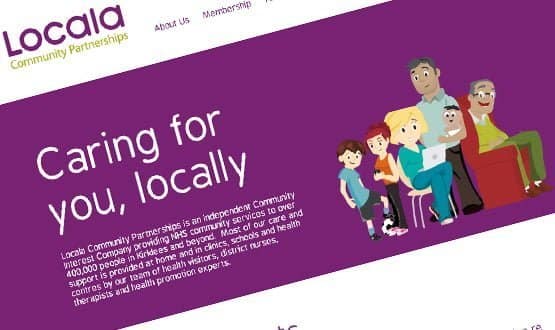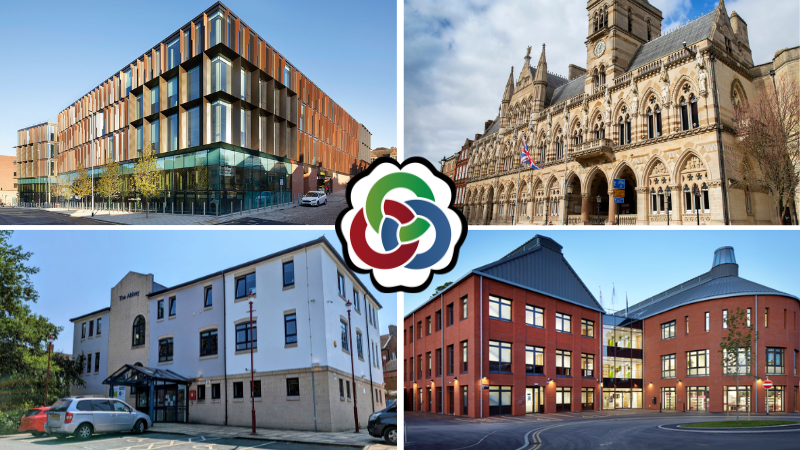A Locala service for local people
- 20 March 2014

District nurse Julie Maguire works in a world where all of her patients’ information is held electronically.
Working for Locala Community Partnerships, her laptop is her lifeline. Traditionally, she would do her patient visits in the morning and spend the afternoon in the office doing administrative tasks such as making referrals, sending faxes and ordering tests.
These days, she spends a little longer in each patient's home and is able to complete everything there and then. This includes including ordering a prescription or, with a patient's permission, accessing the local hospital’s order communications system to review test results.
This means she can spend the entire day out in the community without having to come back to base. While she has very much “gone digital”, she is also conscious that most of her patients are elderly and value the face to face time they have with their district nurse.
This means that while she will check their notes online before entering their home, once she is inside she usually puts the laptop away, does her work, and then sits at a table to complete her tasks.
"Sometimes I'll say ‘I'll order that prescription while I'm here’ or send a message for them. So they can see the benefits like that," she says. "Or they might say 'I had a blood test, is it back?' and I can see ‘Yes, it's back’ and, if it's normal, I'll tell them."
Using Microsoft Lync, she can also contact any of her colleagues immediately via instant message, a phone call or video conference.
Before we meet, she had a staff meeting with other district nurses within a five to six mile radius, who previously would have had to come to an office to catch up with each other.
Getting mobile
Jim Barwick, Locala’s director of transformation, tells EHI the organisation had been doing mobile working in the community for a number of years.
Staff used Panasonic Toughbooks to see a patient's SystmOne electronic patient record while on the move, but could not use email or access other information sources, including the intranet.
"Contracts were ending,” Barwick says. “We knew that the kit was past its best, but – really importantly – we knew that technology had moved along at pace. So we knew we could do things a lot better.”
Locala started procurement for a new provider in September 2012, chose Dell, and rolled out 1,200 new ruggedised laptops in May 2013.
Underpinning this is a cloud-based infrastructure that enables staff to access relevant data from wherever they are, using whatever kit, as part of a fully managed IT service. The CIC also implemented Microsoft Office 365 and Lync to enable better communication between staff across sites.
While only a third of the old Toughbooks were used regularly, just 40 staff out of 1,200 do not log-in to the new system on a regular basis.
"What do we do with this now?"
Around the same time as it ran the procurement, the organisation changed from being the delivery arm of a primary care trust to becoming a social enterprise, with two thirds of staff as shareholders.
"Because we are a social enterprise, we have a culture developing in which people feel involved,” Barwick says. “We are just starting to think about change and doing things more efficiently.”
One innovation has been the introduction of an 8am – 8pm health visitor service that replaces traditional, face-to-face visits with a phone line or video call via Microsoft Lync.
Barwick says it took some time to work out the information governance around the project, but essentially it is about providing services at the time and convenience of patients.
"It can be a bit of an exercise to do something differently, but if patients want something different we need to start thinking about that and how to adapt," he says. "We have some really good projects and ideas starting to come to fruition within particular services and we want to do more of that.”
Locala’s ambition is to be doing10% of all patient contacts virtually by October. At the moment, it is managing less than 1%; so this is a real challenge for staff.
However, early signs are that the new ideas work. Project manager for transformation Amina Hans-Adam explains how a podiatry consultant used Lync to review a patient's toe.
The consultant decided the patient needed surgery without having to come in for a prior appointment. Follow up appointments were also done via video conference.
Healthcare assistants can also use the service to call their team leader for advice while in a patient’s home. "It means they can get advice there and then and treatment can start right away," she says.
The transformation programme has 40 'change agents', who work in their respective teams to promote the digital journey. Enthusiasm for the role meant the organisation had about 100 people apply and numbers had to be streamlined.
All of the projects are being monitored internally for benefits realisation. The organisation is looking at quality and financial benefits, as well as the impact on the workforce in terms of sickness and turnover and staff survey responses.
Challenges
One of the key challenges Locala faces is connectivity. Staff can connect via wi-fi in patients' homes or have to rely on 3G; which can be problematic across such a large, partly rural area.
To address this, it is starting to use mi-fi devices (wireless routers that operate as mobile wi-fi hotspots) and SystmOne's new mobile offering, which allows staff to work offline.
"Of all the problems we have got, connectivity is number one. I'm hoping that SystmOne Mobile will be the thing that really helps,” Barwick says.
Chief executive Robert Flack also admits that after go-live “trouble shooting probably took longer than would have preferred”; but then he adds that this is a fact of life.
“I would have preferred us to be further on now than we are, but I don't want to diminish how far we have come. We have a very sound and secure platform on which we can build in two or three specific areas,” he tells EHI.
The first area he is keen to explore is: “How do we use big data with our partners to fundamentally change the way we deliver services?”
The second is what he calls channel shift. “Where do we, and how do we, channel shift people from face-to-face to video to app-based to self-care? I think we are really close to driving some major changes in this."
A third area of interest is running fully digitised GP practices. Locala already has a GP list size just short of 20,000, and Flack is interested in finding new ways to run GP services that will offer “a very digital experience” to those patients that want it.
Crystal ball gazing
Flack says it is inevitable that the landscape of health care providers is going to change over the next few years and that, eventually, it will look completely different.
“Our approach is very much to work really closely with our partners to get across the importance of community services and to act almost as a disruptive innovator in terms of technology,” he says.
“That has meant taking some of the decisions we have taken – to show there is a different way to deliver some of these things and to constantly strive to be that innovator.”
Listen to this week's EHI Podcast to hear more from the Locala team.




